- Home
- Janice Kay Johnson
Her Amish Protectors Page 9
Her Amish Protectors Read online
Page 9
Nadia forced another smile. “As you obviously know, I’m Nadia Markovic. You’re Lucy...?”
“Slater. Unmarried. So.” She looked around, her expression yearning.
Nadia remembered feeling that way the first time she’d seen an antique quilt at a friend’s house. A Grandmother’s Flower Garden. She could still picture it, feel the texture when she had tentatively touched it. She and her mother had taken a class together, Nadia not admitting her enthusiasm to her friends. She remembered rolling her eyes and saying, “It’ll make Mom happy.” Her mother enjoyed the new hobby, but Nadia had fallen in love.
“Is there any chance you have a beginning class?” Lucy asked. “And, if not, can you steer me to any books that would get me started?”
Nadia hesitated. “As it happens, I have an ongoing class for people in the beginning to intermediate stages. I keep it small enough to allow me to help everyone with whatever problem arises. When students start new projects, I steer them to ones that will be satisfying, just a little challenging, but not so frustrating they quit.”
“When is the class?” Lucy asked eagerly.
“Actually, this afternoon. It’s Tuesdays and Thursdays at two, and I hold additional sessions on Saturday afternoons for anyone who wants to come, but mostly to accommodate people who work weekdays.”
“Sign me up. In the meantime, will you help me choose a project and buy the fabric?”
“My favorite part.” Leading her to the library of well-thumbed books in the back room, Nadia said, “You may get my undivided attention this afternoon. Class attendance has dropped way off. I’ve become a pariah.”
“I’m sorry. I don’t know what’s wrong with people.”
That sounded like the voice of experience. Nadia looked at her sharply, but Lucy was focused on the books.
Nadia let her browse for a while, then sat with her to discuss patterns.
“I encourage beginners to start with a relatively simple pattern, which doesn’t mean the result won’t be gorgeous. A Nine Patch, for example, or even a Double Nine Patch.” She found pictures, then showed Lucy examples of T-Block and Pinwheel quilts.
Lucy agreed bed-size sounded overwhelming. She wanted to do a wall-hanging, crib-size or smaller. Although admitting she loved the Ocean Waves, Bear’s Paw and various star patterns, she decided on the Pinwheel for simplicity. Nadia left her alone to spend a happy hour among the fabrics before she finally asked for help with her final choices.
Nadia always found those choices to be revealing. Timidity or boldness came out, as did an artist’s eye—or the complete lack of one. She had half expected Lucy Slater to choose soft colors, like Julie Baird did. Gentle or even bland colors went with Lucy’s self-effacing manner and wrinkled tan linen pants and muddy-brown T-shirt.
She would have been wrong, though. Instead, Lucy seemed to instinctively understand she needed strong contrast and went with vivid colors on the dark end of the spectrum: a rich rose red, deep teal blue and navy against a pinkish-cream background fabric. Lucy bought several books, a hoop suitable for hand quilting smaller projects, and everything else she needed.
“And I have just enough time to hustle back to Ben’s house and wash and dry the fabric before the class starts.” Beaming, Lucy departed with her bags, leaving Nadia in a whole lot better mood than she’d been.
She couldn’t help wondering what Lucy’s brother would think of her new hobby, though.
CHAPTER SEVEN
BEN HAD ANOTHER crap day in what seemed to be a stretch of them. For June, the weather was damn hot, for starters. Sweating the way he was, he couldn’t figure out how Amish men endured working out in the fields in the heat of the sun wearing long pants and hats. Straw hats, sure, in contrast to the black felt ones worn in colder months, but still. Their only concession to the heat was to roll up their shirtsleeves.
Driving out to talk to another couple who had attended the auction, Ben passed two men plowing under what must have been a spring crop of some kind, draft horses throwing all their weight into the harnesses, the men controlling the plows to dig deep into the rich soil. Neither even looked up at the passing vehicle.
Ben’s morning had been spent canvassing Nadia’s neighbors yet again in hopes someone had seen something last night. No surprise, they’d all been in bed, asleep. A couple had awakened when they heard breaking glass, just as Nadia had, others the explosion. Three people had called 911.
He gritted his teeth. She’d rather be assaulted than call him. Hurt. Scared for her life. He hated knowing she felt that way, hated remembering her face as the search went on.
There had to be a way to get past her animosity, but he didn’t know what it was. And, while he understood, he also remembered their first meeting and that flash of fear. She hadn’t expected to be able to trust him. Why? In Colorado, the police had been the rescuers, not the accusers.
He shook his head. As long as she was a suspect, he had no business thinking about her the way he was.
He learned zilch from talking to the Wagners. The missus didn’t see very well—used a white cane, in fact—and the mister had been bored, present only to please his wife who insisted on buying a quilt to help. They were distressed by the theft and had unhesitatingly replaced the check written that night. Neither had an opinion on who might have done such a thing.
Returning, he once again passed the gristmill, his eye caught by grass matted over time where cars had parked. A quick glint of metal in longer grass had his foot going to the brake, and, after checking the rearview mirror, he backed up.
A bicycle, laid on its side.
For no good reason, he decided to see who was here. A teenager? Could be meeting another one who lived within walking distance. The Amish didn’t often use bicycles, but their teenagers sometimes did. Handy for when Daad was stingy with the horse-and-buggy privileges. Besides, not all farms in the immediate area were Amish owned.
Ben moved quietly, following a path that was more visible than the last time he’d been here. He kept just as wary an eye on the grass and vegetation to each side—he didn’t like snakes or poison ivy.
As he approached the crumbling brick structure, he heard a rustling sound. He laid a hand on the butt of his gun as he took the last couple of steps to be able to see inside.
“Lyle?” he said in surprise.
The head of the historical society jumped and swung around. “Chief Slater? What are you doing here?”
“What are you doing here?” Ben countered. “Is that your bike by the road?”
“I ride for exercise.” He lifted a plastic kitchen trash bag that appeared half-full. “I come now and again to clean up. I just can’t stand to think of this place contaminated with beer cans and fast-food wrappers and what all.”
Condoms presumably fell into the what-all category. Ben saw that Lyle had the common sense to be wearing heavy leather gardening gloves.
He hadn’t had a bag to pick up trash the day Ben had run him down out here. So what had he been doing? Coveting?
“You do realize you’re trespassing?”
Lyle snorted. “If Hershberger won’t take care of a historic site on his land, I will. Would you really arrest me?”
No, not unless Aaron called with a complaint, which he wouldn’t. And, heck, if all Lyle did when he came out here was clean up, he was doing the property owner a favor.
“I wonder if posting no trespassing signs would keep the teenagers away,” Ben speculated.
“More like a few shotgun blasts over their heads,” Lyle snapped. “I thought about setting some mousetraps disguised by leaves. At least it might give a scare to anybody who defiles a site like this.”
“It’s not a church.”
Hate burned in Lyle’s brown eyes. “It’s part of our history. It deserves respect, not—” he hoisted the garbag
e bag “—this.”
After a few calming remarks, Ben left the guy to his self-appointed task. Walking to his car, he pondered the disturbing conversation. For a second there, Lyle Warren’s eyes had burned with the light of a fanatic. Was it really all about the gristmill? Or was something else going on?
* * *
FRIDAY, NADIA TOOK ADVANTAGE of Hannah’s presence to go grocery shopping. Maybe if she hustled through the store during the late morning on a weekday, she could get her groceries without encountering anyone she knew.
She had forgotten the realities of living in a community the size of Byrum. She had no sooner pulled into the parking lot at the Hy-Vee than she spotted a regular customer of hers coming out with a laden grocery cart. Instead of continuing straight ahead, she turned quickly down the next row and parked. Then, head down, she hurried into the store, grabbed a cart and started with fresh produce.
Making her selections fast, Nadia had just added a container of strawberries to her cart when she saw trouble approaching. Allison Edgerton must have started on the other side of the store, because her cart was nearly full. Nadia tried to slink behind a display of bananas, but was too late.
Allison’s expression froze. “I hear your little shop is still open.”
Head up. “Yes, I have every hope that once the police arrest the culprit and recover the money, life will go back to normal.”
“What a shame Chief Slater didn’t find the money Monday,” the older woman said disdainfully. “I trust he’s checked your bank accounts, too.”
“Why would you think for a minute that I kept that money?” Nadia asked in genuine puzzlement. “Was I rude to you when you came into A Stitch in Time? Did you see me cheat a customer?”
Allison looked back at her without a grain of embarrassment. “Who are you accusing? Julie? Karen? How many people knew where to find the money, Ms. Markovic? It can’t be many. And I know them.” Turning her head away, she pushed her cart forward, to all appearances having dismissed Nadia from her mind.
Nadia stayed where she was, glad she had the cart handle to hang on to. She felt shaky. She’d never enjoyed confrontation, but being berated in public was a whole new experience. And to think she’d fled Colorado Springs because people were being too nice to her!
“What a bitch,” a woman said behind her. “You should have slammed your cart into hers. Or...no, tipped hers over. Oh, oops.”
Laughing despite herself, Nadia turned to see who was approaching. The voice wasn’t familiar, but...the face was, even though she had to search her memory to know why.
The young woman—late twenties or early thirties—gaped at her. “I know you. Why do I know you?”
“I’m...not sure. Colorado?”
“No, I’ve never been.”
The platinum blond hair didn’t seem right with the face. Well, it obviously wasn’t natural; her eyebrows were too dark, and she had brown eyes besides. Had her hair been a different color whenever they’d met? Almost immediately, Nadia’s mind formed a different picture. Brown hair, shorter then. Not as much makeup, either. And she didn’t know know her, it had just been one of those casual encounters.
“Trenton,” she blurted. South of Byrum, Trenton attracted tourists drawn to Amish goods and culture. “I remember now. We shared a table at a café because it was so crowded, and got talking.”
The other woman—oh, what was her name? Or had they not introduced themselves?—looked astonished. “You’re right. But...what are you doing here?”
“I live here,” Nadia said, “although, as you may have gathered, I’m not very popular. I don’t know if you heard about the quilt auction—”
“Oh, no! That’s you?”
“Yes. I own the quilt shop here in town. I bought it about six months ago. My name is Nadia Markovic.”
The woman blinked. “I had no idea. You bought the building from me. It was my aunt who died.”
“You’re...” What was the name? “Corinne Bissett?”
“That’s me.” She grimaced. “Obviously, I’m not a sewer or quilter, much to Aunt Edith’s disappointment. I work at the Harley-Davidson dealership.”
“I’m surprised we haven’t run into each other before this,” Nadia said.
“I’m surprised we even recognized each other.” For a second, she looked as if she wished they hadn’t. Probably because of the rumors she’d heard. “That had to be six or eight months ago.”
“More than that, actually. I’d been looking for the right location for a long time before I spotted the ad for your aunt’s business. It was about a year ago when I flew out to look at Trenton and Jamestown and that general area.”
Corinne didn’t look as if she believed Nadia, but she gave a quick, dismissive shrug. “Well. I doubt we have the same friends, and we must not usually grocery shop at the same times. Still—I’m sorry about the mess you’re in.”
“I... Thank you.”
She was talking to Corinne Bissett’s back. She headed for the dairy aisle and was quickly out of sight.
How odd, Nadia thought. She had vaguely wondered if the old lady’s niece lived here in Byrum. She remembered thinking that, if she did, Ms. Bissett would likely stop by to say hi. Well, if she’d had no interest in the fabric store and wasn’t especially close to her aunt, she’d probably just wanted to sell quickly and take advantage of her inheritance, such as it was. With really short shorts, wedge sandals that made Nadia’s feet hurt to look at and a skintight T-shirt, she was a contrast to Nadia in her flowing, gauzy skirt and far more modest knit shirt.
Starting slowly after Corinne, however, it struck Nadia that they did have something more in common than having shared a table for lunch in a crowded restaurant a year ago. Corinne would surely have been interviewed about her aunt’s death, given that she was the heir. And Nadia would put money on it having been Ben Slater who’d interviewed her and probably done his best to scare her, too, in hopes she’d break down and confess all.
They really should have exchanged notes. Maybe Corinne could have given her some tips, Nadia thought wryly.
Hearing two women talking behind her, she remembered her mission: grab enough food to last at least a week and get out of here as quick as possible, preferably without encountering anyone else she knew.
* * *
“DO YOU KNOW many of the Amish?” Lucy asked over the dinner table that evening.
Ben knew she’d been out most of yesterday; he’d seen bulging shopping bags heaped on the floor in her bedroom. He had no idea what she’d done today. Given her question, he had to wonder if she’d been hitting every Amish-owned shop in town.
And wasn’t that what all visitors to Byrum did? If not for the Amish, travelers wouldn’t stop here longer than it took to fill a tank with gasoline or buy burgers and fries to eat on the road.
“I know some, but not well.” He reached for a third biscuit. They tasted good, even if they were out of one of those little tubes that popped open. Lucy had wished aloud that she had some sourdough starter here. Ben wasn’t feeling picky; he was just happy to walk in the door to a home-cooked meal. “The Amish are friendly but reserved,” he continued. “Like I said before, their mandate is to remain apart from the world. That’s not to say real friendships don’t form between Amish and Englischers, but how deep those go, I’m not sure. There are quite a few Amish businesses within the city limits, but not many of them live here. So I deal with an occasional buggy/car collision and complaints about horse patties on the streets and the grooves the steel buggy wheels wear in asphalt, while the Amish refrain from calling on the police whenever possible.” That still frustrated him. Six or eight months ago, a rash of burglaries in the downtown could have been stopped sooner if the Amish business owners had reported their losses instead of admitting to them long after the fact.
Having an idea, he s
aid, “I’ll invite the county sheriff and his wife over for dinner one of these evenings. I think you’d like his wife, Rebecca. Daniel is a lot more involved on the job with the Amish than I am, and both he and Rebecca have family among them.”
“What a good idea.” Lucy smiled at him while nudging the casserole dish in his direction.
Ben didn’t really need seconds, but he helped himself anyway. When he and Lucy were teenagers, she hadn’t been all that interested in cooking, but she’d learned somewhere along the way. He’d have assumed she’d developed the skill because she didn’t want to leave her apartment more than she had to, but she hadn’t hesitated about exploring since she had arrived to stay with him. At least, not during the daytime. She hadn’t asked about nightlife. Maybe she’d guessed it was close to nonexistent. Byrum did have a two-screen movie theater, the only one in the county, and of course there were restaurants. Otherwise, unless a special event was being held—say, square dancing or bingo at the Grange hall—the town shut down early except for the taverns and bars.
He had a sudden memory of the day he and his parents had left her at the dorm at the University of Pennsylvania for her freshman year. Tears in her beautiful eyes as they were saying goodbye, but her cheeks pink with excitement and he could tell how conscious she was of some guys walking by in athletic shorts and sweat-soaked T-shirts. That Lucy was gone forever.
“You haven’t told me what happened,” he said, maybe too abruptly.
“What happ—Oh.” Her expression dimmed.
Sorry he had raised the subject, Ben said, “We don’t have to talk about it.”
“No, it’s okay. It really wasn’t any big deal, just embarrassing.” With her fork, she squished what was left of the casserole on her plate. “I went out with a guy a friend introduced me to.”
He stared at her. “You went on a date.”
Her eyes flashed to meet his, then lowered again. “You don’t have to make it sound so unlikely. Like...like a robin hatching a chicken.”

 Home Deadly Home
Home Deadly Home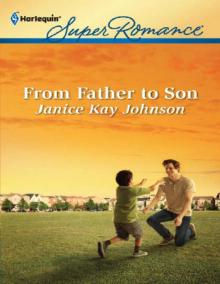 From Father to Son
From Father to Son All the Lost Little Horses (A Desperation Creek Novel Book 2)
All the Lost Little Horses (A Desperation Creek Novel Book 2) Hide the Child
Hide the Child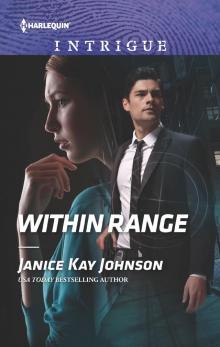 Within Range
Within Range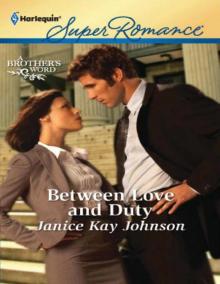 Between Love and Duty
Between Love and Duty First Comes Baby
First Comes Baby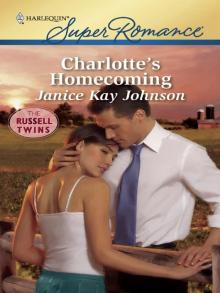 Charlotte's Homecoming
Charlotte's Homecoming In A Heartbeat (HQR Superromance)
In A Heartbeat (HQR Superromance)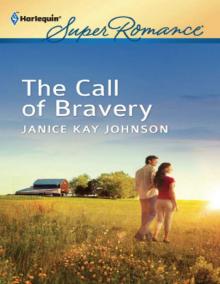 The Call of Bravery
The Call of Bravery In Hope's Shadow
In Hope's Shadow Anything for Her
Anything for Her Harlequin Superromance September 2014 - Bundle 1 of 2: This Good ManPromises Under the Peach TreeHusband by Choice
Harlequin Superromance September 2014 - Bundle 1 of 2: This Good ManPromises Under the Peach TreeHusband by Choice The Baby Agenda
The Baby Agenda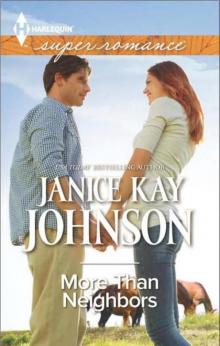 More Than Neighbors
More Than Neighbors Her Amish Protectors
Her Amish Protectors All That Remains
All That Remains Whisper of Revenge (A Cape Trouble Novel Book 4)
Whisper of Revenge (A Cape Trouble Novel Book 4) In a Heartbeat
In a Heartbeat A Mother's Claim
A Mother's Claim Because of a Girl
Because of a Girl Back Against the Wall
Back Against the Wall Dangerous Waters
Dangerous Waters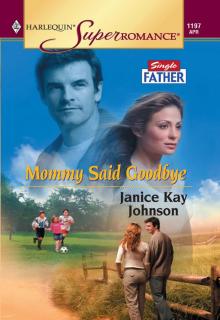 Mommy Said Goodbye
Mommy Said Goodbye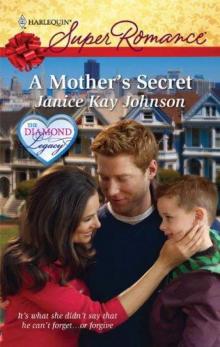 A Mother's Secret
A Mother's Secret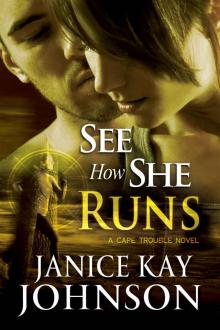 See How She Runs (A Cape Trouble Novel Book 2)
See How She Runs (A Cape Trouble Novel Book 2) Plain Refuge
Plain Refuge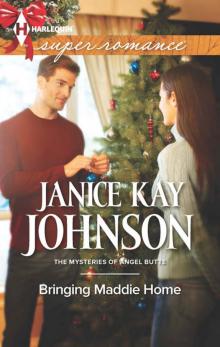 Bringing Maddie Home
Bringing Maddie Home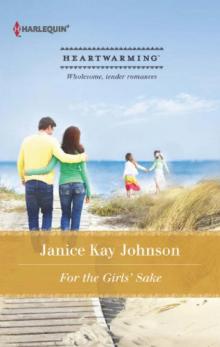 For the Girls' Sake
For the Girls' Sake Through the Sheriff's Eyes
Through the Sheriff's Eyes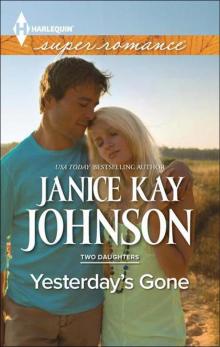 Yesterday's Gone (Two Daughters Book 1)
Yesterday's Gone (Two Daughters Book 1) All a Man Is
All a Man Is Harlequin Superromance January 2014 - Bundle 1 of 2: Everywhere She GoesA Promise for the BabyThat Summer at the Shore
Harlequin Superromance January 2014 - Bundle 1 of 2: Everywhere She GoesA Promise for the BabyThat Summer at the Shore No Matter What
No Matter What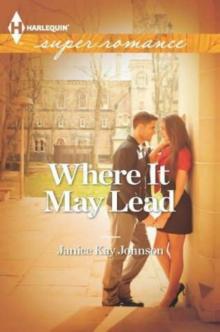 Wakefield College 01 - Where It May Lead
Wakefield College 01 - Where It May Lead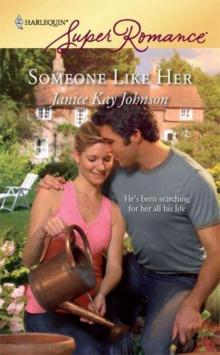 Someone Like Her
Someone Like Her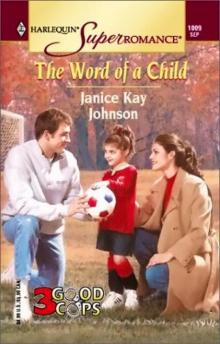 THE WORD OF A CHILD
THE WORD OF A CHILD Harlequin Superromance May 2016 Box Set
Harlequin Superromance May 2016 Box Set Open Secret
Open Secret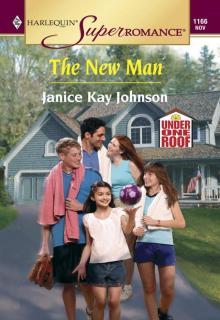 The New Man
The New Man Finding Her Dad
Finding Her Dad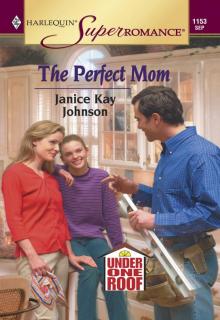 The Perfect Mom
The Perfect Mom All Through The House
All Through The House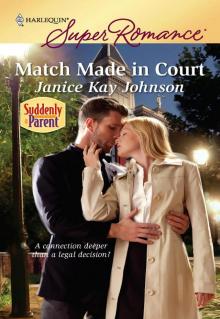 Match Made in Court
Match Made in Court Making Her Way Home
Making Her Way Home From This Day On
From This Day On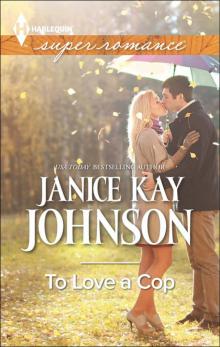 To Love a Cop
To Love a Cop The Hero's Redemption
The Hero's Redemption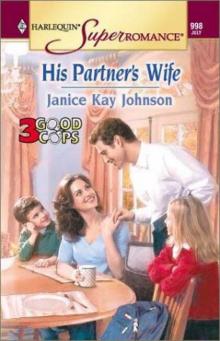 HIS PARTNER'S WIFE
HIS PARTNER'S WIFE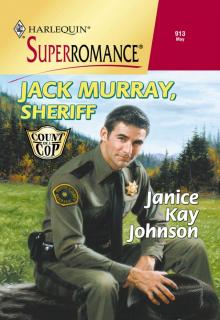 Jack Murray, Sheriff
Jack Murray, Sheriff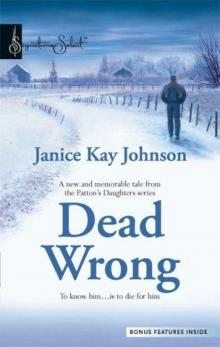 Dead Wrong
Dead Wrong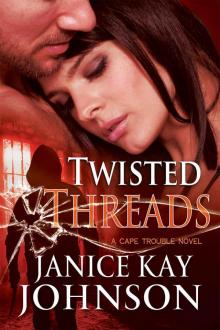 Twisted Threads (A Cape Trouble Novel Book 3)
Twisted Threads (A Cape Trouble Novel Book 3)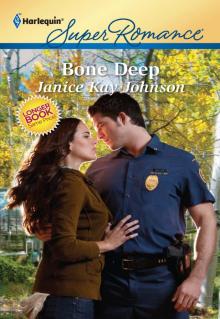 Bone Deep
Bone Deep The Closer He Gets
The Closer He Gets With Child
With Child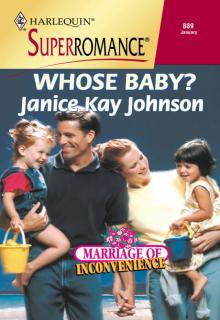 Whose Baby?
Whose Baby? Kids by Christmas
Kids by Christmas